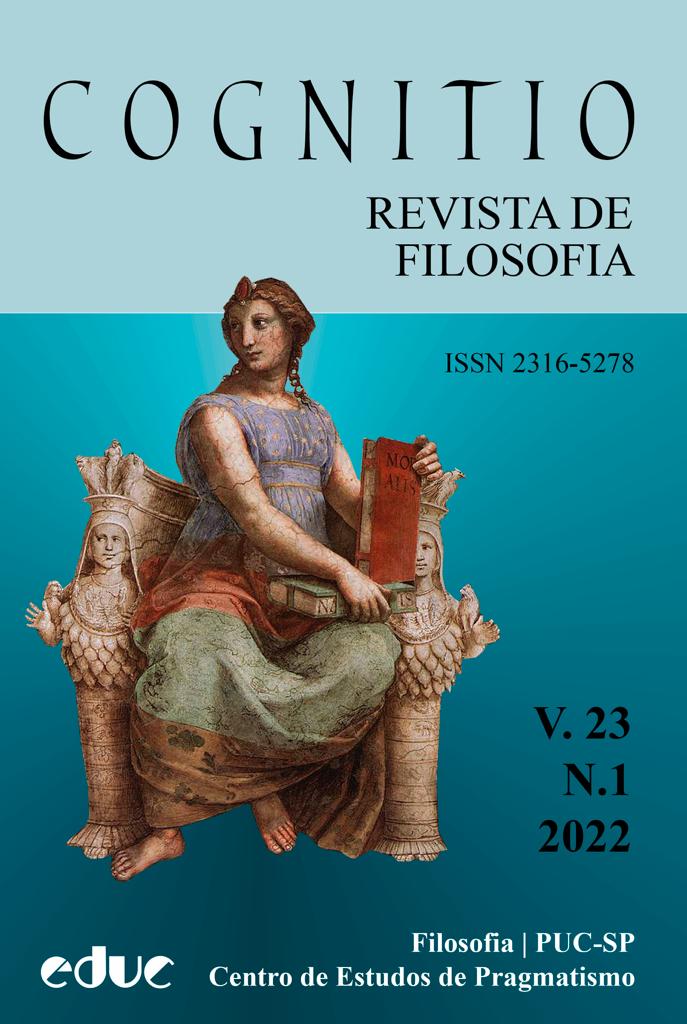John Dewey and the ethics of animal experimentation
the beginning of a pragmatist debate on anti-speciesist moral deliberation
DOI:
https://doi.org/10.23925/2316-5278.2022v23i1:e58364Abstract
The work aims to highlight the ethics of animal experimentation in John Dewey, observing whether it is possible to propose an anti-speciesist moral deliberation. Thus, we will analyze the Deweyan way of allying an ethics focused on human progress, even if it results in behaviors that trigger the exploitation of non-human animals, gradually verifying if it is possible to propose a moral deliberation in a creative way through the human experience and that benefits the non-human animals. At first, the concept of speciesism will be exposed, as well as its derivation, anthropocentric speciesism, which will be detailed, to show how human animals incur certain arguments that make the exploitation of non-human animals viable, especially in the discussion of Deweyan pragmatism. Second, we will deepen the issue of speciesism through a pragmatic attitude, which, in addition to highlighting the moral barrier from Dewey’s classic pragmatism, will also show arguments in favor of moral deliberations that promote the well-being of non-human animals, according to with contemporary pragmatism, since this debate on animal welfare in the context of pragmatist morality is recent. Our work relies on the theoretical contribution of Dewey (2020), Fesmire (2004), Singer (2010), among others. The research indicates that by manifesting an expansive possibility of experience, through human nature, created by a network of mutual social relationships that is in constant movement, and that needs to adapt to new ethical understandings, it is possible to align both emotions and human sympathy to enable new creative social experiences that spark moral deliberations that favor diverse sentient beings.
References
ALBRECHT, James M. What does Rome Know of Rat and Lizard: Pragmatic Mandates for Con- sidering Animals in Emerson, James and Dewey. In: MCKENNA, E; LIGHT, A. (org.). Animal pragmatism: rethinking human-nonhuman relationships. Bloomington: Indiana University Press, 2004. p. 19-42.
ARRAS, John D. Freestanding pragmatism in law and Bioethics. Theor Med Bioeth, v. 22, n. 2, p. 69-85, 2001. DOI: https://doi.org/10.1023/A:1011495624471.
CLARK, Stephen. Speciesism. In: BEKOFF, M; MEANEY, C (Org.). Encyclopedia of animal rights and animal welfare. Chicago: Fitzroy Dearborn, 1998. p. 320-321.
CUNHA, Luciano Carlos. Discriminações interespecíficas e intraespecíficas: por que a comparação precisa ser feita? Synesis, v. 12, n. 2, p. 148-273, 2o semestre de 2021b.
CUNHA, Luciano Carlos. If natural entities have intrinsic value, should we then abstain from help- ing animals who are victims of natural processes? Relations: Beyond Anthropocentrism, v. 3, n. 1, p. 51-63, 2015. DOI: https://doi.org/10.7358/rela-2015-001-cunh.
CUNHA, Luciano Carlos. Uma breve introdução à ética animal: desde as questões clássicas até o que vem sendo discutido atualmente. Curitiba: Appris, 2021a.
DEWEY, John. Experience and Nature. London: The Foundation, 1929.
DEWEY, John. The Ethics of Animal Experimentation. In: America’s public philosopher: essays on social justice, economics, education, and the future of democracy. New York: Columbia University Press, 2020.
FESMIRE, Steven. Dewey and animal ethics. In: MCKENNA, E; LIGHT, A. (org.). Animal prag- matism: rethinking human-nonhuman relationships. Bloomington: Indiana University Press, 2004. p. 43-62.
HADLEY, John. Animal Neopragmatism: From Welfare to Rights. Penrith: Palgrave Macmillan, 2019.
HORTA, Oscar. What is Speciesism?. The Journal of Agricultural and Envaironmental Ethics, v. 23, p. 243-266, 2010. DOI: https://doi.org/10.1007/s10806-009-9205-2.
HORTA, Oscar. Na defesa dos animais. Santiago: Axóuxere, 2018.
MCKENNA, Erin; LIGHT, Andrew. Pragmatism and the Future of Human-Nonhuman Relation- ships. In: MCKENNA, E; LIGHT, A. (org.). Animal pragmatism: rethinking human-nonhuman relationships. Bloomington: Indiana University Press, 2004. p. 1-16.
MCREYNOLDS, Phillip. Overlapping horizons of meaning: dewean approach to the moral stand- ing of nonhuman animals. In: MCKENNA, E; LIGHT, A. (org.). Animal pragmatism: rethinking human-nonhuman relationships. Bloomington: Indiana University Press, 2004. p. 63-84.
NACONECY, Carlos M. Ética animal... Ou uma “ética para vertebrados”?: um animalista também pratica especismo?. Revista Brasileira de Direito Animal, v. 2, n. 3, p. 119-153, 2007. DOI: https:// doi.org/10.9771/rbda.v2i3.10361.
RORTY, Richard. Contingency, Irony and Solidarity. Cambridge: Cambridge University Press, 1989.
SINGER, Peter. Libertação Animal. Trad. Marly Winkler e Marcelo Brandão Cipolla. São Paulo: Martins Fontes, 2010.
Downloads
Published
How to Cite
Issue
Section
License
Copyright (c) 2022 http://creativecommons.org/licenses/by/4.0/

This work is licensed under a Creative Commons Attribution 4.0 International License.









